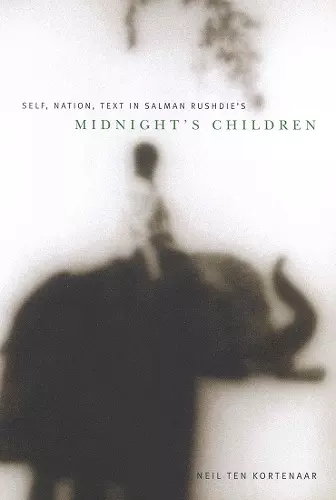Self, Nation, Text in Salman Rushdie's "Midnight's Children"
Format:Hardback
Publisher:McGill-Queen's University Press
Published:21st Jan '04
Currently unavailable, our supplier has not provided us a restock date

An in-depth study of Midnight's Children, one of the most important novels of the twentieth century.
Many non-Indian readers find the historical and cultural references in Salman Rushdie's Midnight's Children demanding. In his close reading of the novel, Neil ten Kortenaar offers post-colonial literary strategies for understanding Midnight's Children that also challenge some of the prevailing interpretations of the novel.Many non-Indian readers find the historical and cultural references in Salman Rushdie's Midnight's Children demanding. In his close reading of the novel, Neil ten Kortenaar offers post-colonial literary strategies for understanding Midnight's Children that also challenge some of the prevailing interpretations of the novel. Using hybridity, mimicry, national allegory, and cosmopolitanism, all key critical concepts of postcolonial theory, ten Kortenaar reads Midnight's Children as an allegory of history, as a Bildungsroman and psychological study of a burgeoning national consciousness, and as a representation of the nation. He shows that the hybridity of Rushdie's fictional India is not created by different elements forming a whole but by the relationship among them. Self, Nation, Text in Salman Rushdie's Midnight's Children also makes an original argument about how nation-states are imagined and how national consciousness is formed in the citizen. The protagonist, Saleem Sinai, heroically identifies himself with the state, but this identification is beaten out of him until, in the end, he sees himself as the Common Man at the mercy of the state. Ten Kortenaar reveals Rushdie's India to be more self-conscious than many communal identities based on language: it is an India haunted by a dark twin called Pakistan; a nation in the way England is a nation but imagined against England. Mistrusting the openness of Tagore's Hindu India, it is both cosmopolitan and a specific subjective location.
"Kortenaar's study is a powerfully intelligent scholarly work and demonstrates a richly nuanced engagement in the hermeneutic circle of reader-text-author. ... [The book] has admirable sweep and vigor, is rich in detail, and suggestive in its larger conclusions." R.S. Krishnan, International Fiction Review
ISBN: 9780773526150
Dimensions: unknown
Weight: 600g
304 pages